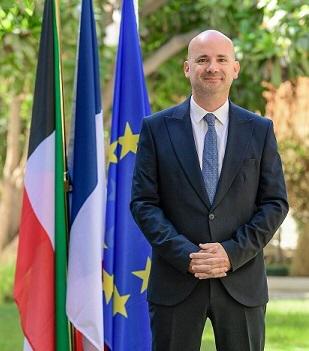We are the Oceans
France to host the Third United Nations Ocean Conference to advance global ocean protection

By H.E Olivier Gauvin
Ambassador of France to Kuwait
France will host the third United Nations Conference to Support the Implementation of Sustainable Development Goal 14 – “Conserve and sustainably use the oceans, seas and marine resources for sustainable development” (UNOC) – from June 9 to 13, 2025.
Together, we can make the third United Nations Ocean Conference a defining moment—for our communities, for future generations, and for the planet.
This vital event is expected to bring together around 100 Heads of State and Government, along with tens of thousands of researchers, scientists, economic leaders, activists, and global citizens. France’s objective for the conference is unequivocal: to protect the oceans through concrete, action-oriented commitments.
The oceans are a shared global heritage. They nourish and safeguard populations, fuel innovation, inspire exploration, and provide sustainable energy, trade routes, natural resources, and boundless scientific potential. One in every three people worldwide depends on the oceans for their livelihood.
However, the oceans are under severe threat. Despite their immense importance, they remain insufficiently understood, lack cohesive global governance, and suffer from inadequate funding for preservation.
Alarmingly, over eight million tons of plastic waste are dumped into the oceans each year, according to a study published in Science. Additionally, more than one-third of global fish stocks are overexploited, while ocean acidification, rising sea levels, and ecosystem destruction continue to accelerate as direct consequences of climate change.
Action is urgent. The need for effective multilateral cooperation to safeguard the oceans has never been greater.
Ten years after COP21 and the signing of the Paris Agreement — which set a binding international framework to combat climate change — the 2025 United Nations Ocean Conference represents a historic moment.
The expected outcome, known as the “Nice Ocean Agreements,” aims to serve as a landmark global pact to protect and sustainably use the oceans, aligned with the Sustainable Development Goals (SDGs) adopted by the United Nations in 2015.
To achieve this, the discussions in Nice must be highly practical and centered on action — focusing on improved ocean governance, increased funding, and enhanced scientific knowledge.
Central to ocean governance is the ratification and implementation of the Agreement on the Conservation and Sustainable Use of Marine Biological Diversity of Areas Beyond National Jurisdiction (BBNJ Agreement).
The high seas, which account for more than 60% of the world’s oceans, currently lack comprehensive international legal regulation. This legal vacuum has led to severe ecological degradation, including extensive hydrocarbon and plastic pollution, unregulated fishing, and harm to protected marine species. To address this, the BBNJ Agreement must be ratified by at least 60 countries to enter into force.
Effective ocean protection also hinges on robust public and private sector investment and a committed shift toward a sustainable blue economy. Maintaining the oceans’ economic potential requires preserving their capacity to regenerate. During the conference, various commitments are expected in sectors such as global trade, maritime transport, tourism, and responsible investment.
Moreover, we cannot protect what we do not sufficiently understand. While we have mapped the surface of the Moon and Mars, vast portions of the ocean floor — covering 70% of the Earth’s surface —remain unexplored. Enhancing and democratizing ocean knowledge is vital. Science, innovation, and education must be leveraged to deepen our understanding of marine environments and foster global awareness.
In a time of rapid climate change and escalating marine exploitation, ocean protection is not a peripheral issue — it is a global priority. It embodies our shared responsibility amid mounting challenges to multilateralism. The oceans connect us all and are essential to our collective future.
Together, we can make the third United Nations Ocean Conference a defining moment—for our communities, for future generations, and for the planet.












